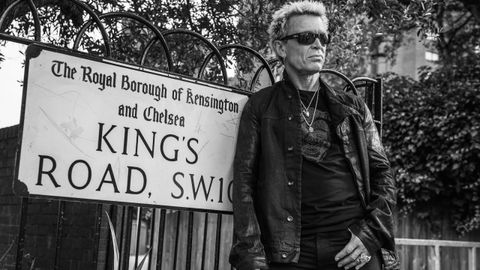Did Billy Idol just die? Kings & Queens Of The Underground is his first album for nine years (let’s leave the 2006 Christmas record out of this), but it feels like an epitaph: half celebratory valedictory, half wistful farewell. It sounds like the final album someone obsessed with the daft old-fashioned notion of the redemptive power of rock’n’roll might make. It takes itself very seriously and it is monumentally silly. It features absurd posturing yet it is really quite poignant; Billy’s Last Stand, as he takes every musical and lyrical cliché and affords them a deep resonance, a touching meaning, because he is a true believer. And because the 58-year-old caner knows he might not get another chance.
Simultaneous to this album’s release, Idol’s autobiography, Dancing With Myself, is published. He’s doing a lot of looking back, a lot of soul-searching. It’s all over this album; a mixture of regret and raging against the dying of the light, of lonesome tears and angry fist-punching, of sadness at time’s passing, and a determination to face the future with a death-or-glory attitude. It’s a winning, moving combination. So he’s making his last bid for immortality, after having become the world’s forgotten boy, record sales and chart appearances diminishing, with the odd cameo in a movie like The Wedding Singer to remind people of his national (US and UK) treasure status.
To help him make this final stab at greatness, he has enlisted longtime collaborator and guitarist Steve Stevens, and producer Trevor Horn. The album is, as you might expect, an epic of melodic bombast. Idol recently declared his fondness for “not simple, but primitive music”, and that’s what Horn does. He takes rock’s basics – the rhythm and riff – and gives them a good polish. Kings & Queens has the shiny power of the big, dumb metal from Idol’s 80s MTV heyday.
Bitter Pill opens the album like a gunslinger galloping back into town. It’s a thunderous anthem, high-energy but undercut with a sense of sorrow. The song has been doing the rounds for a while. Idol was waiting until he was old enough to invest it with the requisite grizzled, hard-won wisdom. Can’t Break Me Down is more upbeat. The first single, it has punk gall, a glam thump and a metallic KO. It is exuberant good-times rock’n’roll, with infectious pop hooks and crescendos so thrillingly perfect you suspect Darkness-style subterfuge. But this is Billy Idol, so you take every brazen proclamation (‘I’m the original assassin,’ indeed) at face value.
The drums bash, the bass pounds, the guitars slash, and the vocals are so clear in the mix you can hear every word. Crank it up loud and your neighbours will be roaring along with you. The song structures are predictable, but that’s the point. Everyone concerned evidently wanted this to sound exactly like a Billy Idol album. One Breath Away is the ballad with shades of Eyes Without A Face, Postcards From The Past is the dead ringer for Rebel Yell, and so on.
On the fast tracks Idol goes for it unapologetically, on the slow ones he assumes a new ruined grandeur. Sometimes he walks the narrow line between self-parody and sincerity. The title track leafs through Idol’s back pages, from his punk days (‘Last night in the Roxy we fucked on the floor/Shot up in the bathroom and said we were bored’) through his 80s success (‘Nineteen-eighty-four and Rebel Yell had the floor/All we said was “more more more”’), set to a sort of folk madrigal. An acoustic guitar plucks a delicate motif over flute and strings as Idol confesses his venal habits (‘Sold all my vinyl, it went up my arm/And I thought rock’n’roll couldn’t do me no harm’). It is bonkers yet strangely affecting.
The potential for mockery on Save Me Now is equally great, but Idol should be applauded for his cheek, for the football chant of a chorus and the pristine riffing, honed for maximum anthemic effect. Idol seems to be auditioning retrospectively for the starring role in Mad Max Beyond Thunderdome on Postcards From The Past. The allusions to Rebel Yell are surely deliberate – he has to trade on past glories because this is a record about past glories.
Formerly the prolific swordsman, more often on Kings & Queens Idol is the victim of betrayal. On the ravishing melodrama Eyes Wide Shut he discovers his lover’s infidelity on social media, a new cruel public way of experiencing humiliation. Idol is bloody but unbowed. ‘I’ve got to walk on,’ as he sings on Ghosts In My Guitar. One (sublime, brooding, melancholy) track later he’s declaring he has Nothing To Fear.
An album exploring loneliness and loss, anguish and dread, from Billy Idol? But it’s not all faithless women and boulevards of broken dreams. To prove you can’t take him alive, Idol ends the album as it began, with a burst of fury: Whiskey And Pills is a speed rocker with a guitar solo that is pure Eddie Van Halen and a lyric that serves as a justification for Idol’s last 40 years. ‘My life is going down the drain… But when I’m high I feel no shame.’ Unrepentant one minute, penitent the next.
And yet Kings & Queens coheres because it presents Idol, the real man, torn between extremes. “I am hopelessly divided between the dark and the good, the rebel and the saint, the sex maniac and the monk, the poet and the priest, the demagogue and the populist,” he admits in his autobiography. And this album plays out that confusion, beautifully.
If he died tomorrow this would be one hell of a memorial. The plastic punk with the cartoon sneer has made his grown-up masterpiece. Just call it his Last Bill And Testament.


